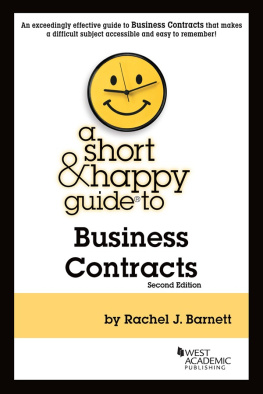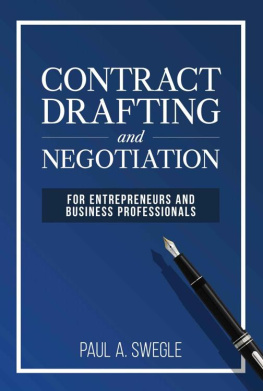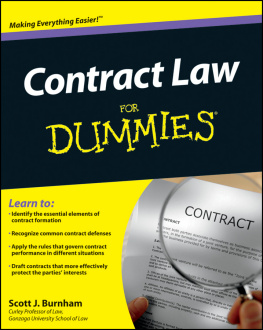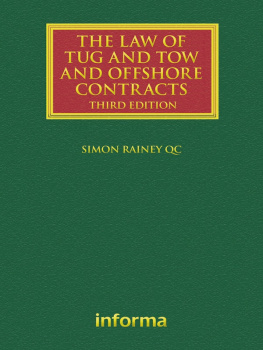[Ed.: This page appears on the inside cover of the print book.]
Use the following questions as a quick reference to help guide your decision as to which contract concept will memorialize a specific business term properly.
1. Representation and warranty: Has a party said something on which the other party is relying?
2. Covenant: Has a party promised to do something in the future? A covenant creates a duty to perform, also known as an obligation. A right is the flip side of a covenant.
3. Discretionary authority: Does a party have a choice or has it been given permission (a kind of choice) to do something?
4. Declaration: Is the business term a definition? Does it establish a policy?
(a) To test whether a business term is a declaration, ask whether a party would want a monetary remedy if it were not true.
(b) If a party would want a monetary remedy, the business term is not a declaration. It must be either a representation and warranty or a covenant.
5. Conditions: Does the business term require that one thing must happen before another thing happens? Stated differently, must events occur in a chronological sequence?
(a) Condition to an obligation (and the obligation). If an event occurs, X has an obligation.
(i) Ongoing condition: The condition is not a condition to the performance of a subject matter performance obligation.
(ii) Walk-away condition: The condition is a condition to the performance of a subject matter performance obligation. If a walk-away condition is not satisfied, the party for whose benefit the condition exists may
(A) choose to waive the failure of the condition and perform the subject matter performance obligation;
or
(B) choose not to perform the subject matter performance obligation without being in breach and walk away from the contractual relationship.
Although the failure of the condition creates a choice for the party that would have had the obligation, the contract provision to be identified is not discretionary authority. It is the condition to an obligation and the obligation. The choice arises as the common law consequence of the failure to satisfy the condition to the subject matter performance obligation, not because of contractual agreement.
(b) Condition to discretionary authority (and the discretionary authority): Must an event occur before a party may exercise discretionary authority?
(c) Condition to a declaration (and the declaration): Must an event occur before a policy has substantive consequences?
(d) If/then test: When creating an if/then statement, the then clause should state who has the obligation to perform or who has the discretionary authority.
Correct
If X happens, Y is obligated to perform...
Do not use the following formulation:
Wrong
If X does not happen, then Y is not obligated to...
This formulation states the common law consequences of the failure to satisfy a condition, not the condition to an obligation and its obligation.

Drafting Contracts
EDITORIAL ADVISORS
Vicki Been
Boxer Family Professor of Law
New York University School of Law
Erwin Chemerinsky
Dean and Distinguished Professor of Law
University of California, Irvine, School of Law
Richard A. Epstein
Laurence A. Tisch Professor of Law
New York University School of Law
Peter and Kirsten Bedford Senior Fellow
The Hoover Institution
Senior Lecturer in Law
The University of Chicago
Ronald J. Gilson
Charles J. Meyers Professor of Law and Business
Stanford University
Marc and Eva Stern Professor of Law and Business
Columbia Law School
James E. Krier
Earl Warren DeLano Professor of Law
The University of Michigan Law School
Richard K. Neumann, Jr.
Professor of Law
Maurice A. Deane School of Law at Hofstra University
Robert H. Sitkoff
John L. Gray Professor of Law
Harvard Law School
David Alan Sklansky
Yosef Osheawich Professor of Law
University of California at Berkeley School of Law
Kent D. Syverud
Dean and Ethan A. H. Shepley University Professor
Washington University School of Law

DRAFTING CONTRACTS
How and Why Lawyers Do What They Do
Second Edition
Tina L. Stark
Visiting Professor
Fordham University School of Law

2014 Stark Legal Education, Inc.
Published by Wolters Kluwer Law & Business in New York.
Wolters Kluwer Law & Business serves customers worldwide with CCH, Aspen Publishers, and Kluwer Law International products. (www.wolterskluwerlb.com)
No part of this publication may be reproduced or transmitted in any form or by any means, electronic or mechanical, including photocopy, recording, or utilized by any information storage or retrieval system, without written permission from the publisher. For information about permissions or to request permissions online, visit us at www.wolterskluwerlb.com, or a written request may be faxed to our permissions department at 212-771-0803.
To contact Customer Service, e-mail , call 1-800-234-1660, fax 1-800-901-9075, or mail correspondence to:
Wolters Kluwer Law & Business
Attn: Order Department
PO Box 990
Frederick, MD 21705
Library of Congress Cataloging-in-Publication Data
Stark, Tina L., 1953- author.
Drafting contracts: how and why lawyers do what they do / Tina L. Stark, Visiting Professor, Fordham University School of Law.
p. cm.
Includes bibliographical references and index.
eISBN 978-1-4548-2905-8
1. ContractsUnited States. 2. ContractsUnited StatesLanguage. 3. Legal composition. I. Title.
KF807.S73 2013
346.73022dc23
2013039766
ABOUT WOLTERS KLUWER LAW & BUSINESS
Wolters Kluwer Law & Business is a leading global provider of intelligent information and digital solutions for legal and business professionals in key specialty areas, and respected educational resources for professors and law students. Wolters Kluwer Law & Business con-nects legal and business professionals as well as those in the education market with timely, specialized authoritative content and information-enabled solutions to support success through productivity, accuracy and mobility.
Serving customers worldwide, Wolters Kluwer Law & Business products include those under the Aspen Publishers, CCH, Kluwer Law International, Loislaw, ftwilliam.com and MediRegs family of products.
CCH products have been a trusted resource since 1913, and are highly regarded resources for legal, securities, antitrust and trade regulation, government contracting, banking, pension, payroll, employment and labor, and healthcare reimbursement and compliance professionals.
Aspen Publishers products provide essential information to attorneys, business profes-sionals and law students. Written by preeminent authorities, the product line offers ana-lytical and practical information in a range of specialty practice areas from securities law and intellectual property to mergers and acquisitions and pension/benefits. Aspens trusted legal education resources provide professors and students with high-quality, up-to-date and effective resources for successful instruction and study in all areas of the law.
Next page









